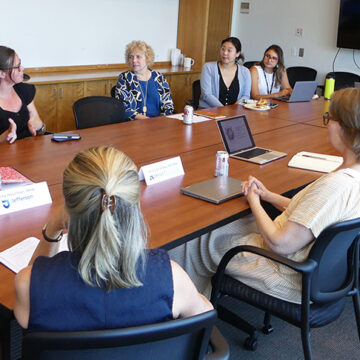There is no such thing as PFAS-free synthetic turf
Aimin Chen, PhD, MD, is interviews for an article discussing the use of synthetic turf in the city’s future play fields, particularly in South Philly.
How can you reduce health effects of endocrine-disrupting chemicals?
Nearly 300 researchers, clinicians, and community members gathered to share research, steps people can take to reduce exposure to EDCs.
Women For A Healthy Environment and PRCCEH announce findings of pilot project on shade structures in childcare settings
Women For A Healthy Environment (WHE) released the findings of its 2024 Shade Study, a pilot project investigating the impact of shade structures on outdoor play in childcare settings within 4 Philadelphia environmental justice neighborhoods.
Children’s Health & Extreme Heat
When exposed to heat and humidity, children are at higher risk of heat-related illness than most adults, and this can be worse if a child becomes dehydrated.
Student campaign bans pesticides at Drexel
Drexel University’s groundskeepers will replace the synthetic chemicals campus-wide, with an organic turf program.
Asthma medication op-ed by Center member
Center member Tyra Bryant-Stephens, along with Chen Kenyon and Bianca Nfonoyim Bernhard wrote an op-ed for Stat News titled,As childhood asthma worsens, insurers restrict access to an essential medication.
Indoor Air Quality Study Completion in Philadelphia Childcare Facilities
Women for a Healthy Environment recently announced their report following an EPA-sponsored indoor air quality study of Philadelphia childcare facilities.
Not So Sweet: Applesauce, Lunchables and Lead – Webinar Recording
The final PRCCEH virtual seminar of the Spring 2024 semester. Featuring, Kevin Osterhoudt, MD is a pediatrician, medical toxicologist and the Medical Director of The Poison Control Center at Children’s Hospital of Philadelphia.
A look back at the 2024 Academy for Environmental Exposure Reduction
A look back at the 2024 Academy for Environmental Exposure Reduction by one of the student mentors, Colin Battis.










